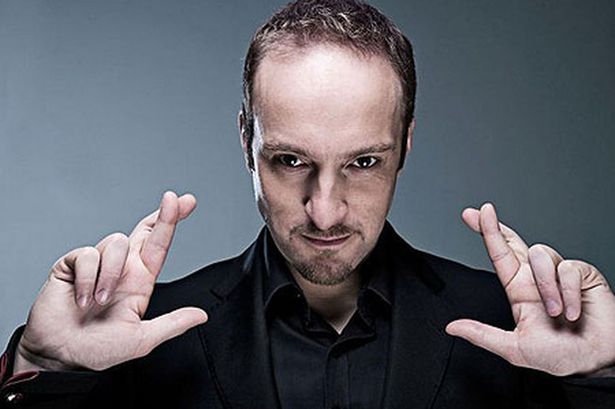JAMIE PARKER ON HIS YEAR OF SAYING ‘YES’
Jamie Parker, website buy more about currently starring in the transfer of Chichester Festival Theatre’s production of Guys and Dolls to the West End’s Savoy Theatre (pictured above), interviewed by Fiona Mountford in the Evening Standard.
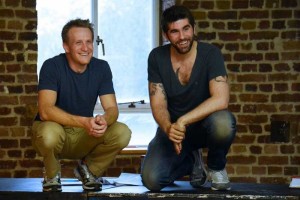 Mountford writes: “Guys and Dolls caps the end of a glorious year of musical theatre for Parker, 36. He started 2015 by starring in Jamie Lloyd’s much-praised revival of Stephen Sondheim’s Assassins at the Menier Chocolate Factory (pictured labove with co-star Simon Lipkin) and then moved on to High Society at the Old Vic, taking in a couple of Proms en route. Check out the YouTube clip of him singing I Won’t Dance from the Sinatra Prom — it’ll bring a smile to cheer the dullest day. It has been, he says, “a year of saying ‘yes’”.
Mountford writes: “Guys and Dolls caps the end of a glorious year of musical theatre for Parker, 36. He started 2015 by starring in Jamie Lloyd’s much-praised revival of Stephen Sondheim’s Assassins at the Menier Chocolate Factory (pictured labove with co-star Simon Lipkin) and then moved on to High Society at the Old Vic, taking in a couple of Proms en route. Check out the YouTube clip of him singing I Won’t Dance from the Sinatra Prom — it’ll bring a smile to cheer the dullest day. It has been, he says, “a year of saying ‘yes’”.
Mountford goes on:
Few performers manage to move as fluidly between straight plays and musicals as Parker; Bertie Carvel is another example but there aren’t many others. Parker feels the two genres are unhelpfully demarcated, with an unmistakable bias towards the former. “I think you need to be very careful of getting ‘stuck’ in musical theatre,” he says. “People in the industry like to know what product it is that you’re selling.”
He worked hard not to get “stuck” after graduating from Rada and in recent years has garnered fine reviews for a diverse range of classic roles, including Prince Hal and Henry V at the Globe. Nonetheless, he is wonderfully self-deprecating about the musicals that “got away”, including American Psycho, “possibly because I sang a Whitney Houston song at the audition!”
Parker says he’d like to “branch out a little bit”, in directions as yet unspecified, and indeed he nearly pulled off the branching-out coup of the decade by making it through to the final round of interviews to succeed Dominic Dromgoole as artistic director of the Globe Theatre, a job that eventually went to Emma Rice. “I didn’t expect to get to the final round,” he says. “That entire experience was the most unremittingly positive one of my entire working life.”
DAVID MORRISSEY: WHAT DID HIS PARENTS THINK OF HIS CAREER CHOICE?
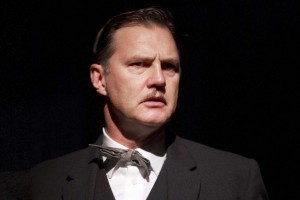 David Morrissey, currently starring in the transfer of Martin McDonagh’s Hangmen from the Royal Court to Wyndham’s, interviewed in The Guardian on November 27 by Sarah Crompton, on what his parents thought of his acting ambitions.
David Morrissey, currently starring in the transfer of Martin McDonagh’s Hangmen from the Royal Court to Wyndham’s, interviewed in The Guardian on November 27 by Sarah Crompton, on what his parents thought of his acting ambitions.
Crompton writes, “His passion for acting was forged in his early years as a working class lad in the Everyman youth theatre. He instantly knew it was more than a hobby, but his parents were worried. “When I told them I wanted to be an actor it was like telling them I wanted to be an astronaut. Not because it was highfalutin but because it was a world they didn’t know. They were worried about the unknown.”
His father died just as he was starting to find success. “Obviously that was traumatic for me, but it also opened the way because it meant that I suddenly saw that life was short, that I had better get a move on and go for what I love and what I want. I did that thing everyone advises you against. I just put all my eggs in one basket. I thought, this has to work.”
JOHNNY FLYNN ON LOOKING FORWARDS BUT SEEMING OLD-FASHIONED
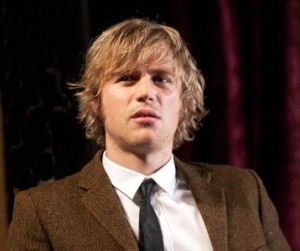 Johnny Flynn, currently also starring in Hangmen, interviewed in the Sunday Times (behind paywall) on December 13 on the virtues of honouring Shakespearean verse speaking, when he appeared in the Rylance productions of Twelfth Night and Richard III. Louise Wise writes,
Johnny Flynn, currently also starring in Hangmen, interviewed in the Sunday Times (behind paywall) on December 13 on the virtues of honouring Shakespearean verse speaking, when he appeared in the Rylance productions of Twelfth Night and Richard III. Louise Wise writes,
The Rylance Twelfth Night was a notable success, not least for being in period dress and design. To Flynn, it was “quite revolutionary to do that, in a time when people are trying to sandwich Shakespeare into concepts”. He is sceptical of those versions; he thinks they tend to yield diminishing returns. (“I think Shakespeare done in a patronising way, you get that back”.) He also thinks “the sense of the verse only works if you speak it properly, and if you pay attention to it. It’s bit like 12-bar blues being played rhythmically — you enjoy when each thing is meant to come, when it comes, because of how it’s laid out.” Trust the folkie to champion good old-fashioned verse-speaking. But when I ask if he feels modern, he has a robust response.
“I get really confused when people say what I’m doing is old-fashioned, because I see what I do as looking forward. I’m very much in the here and now. I just do certain things because it’s in my nature, or instinct, to do so.”
DERREN BROWN ON THE SECRET OF HAPPINESS
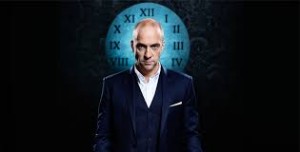 Derren Brown, currently starring in the West End in his latest show Miracle, interviewed in the Sunday Times (behind paywall) on December 13, by Lynn Barber.
Derren Brown, currently starring in the West End in his latest show Miracle, interviewed in the Sunday Times (behind paywall) on December 13, by Lynn Barber.
Barber writes:
I am startled when he says he is writing a book about happiness, because he doesn’t strike me as a particularly happy man — rather the reverse. There is a sort of flatness to him, a general lack of vitality; I can’t imagine him ever leaping out of bed saying, “Hey, it’s a beautiful morning, let’s go for a walk.”…
So what exactly will he be saying in his book on happiness? Is he trying to tell people how to be happy?
“I hope so. Part of the problem is that we think happiness is some kind of commodity we’re entitled to. But that’s a very modern idea. Before the Enlightenment, people never, ever thought of it. I prefer the old idea of just seeing it as tranquillity. It’s more about removing the obstacles to happiness, the pointless frustrations that come from trying to control things you can’t control.”
Has he spent a lot of time looking for happiness?
“I’ve never been a searcher, but I’ve found the writings of the stoics and the Epicureans useful. Seneca, for instance: learn to desire what you’ve already got, not desire things you haven’t. I’ve always been like that. Never had any ambitions to be on TV or to be famous, or anything like that. It’s about being in the moment. I find that helps a lot.”
CHRISTOPHER HAMPTON ON BEING BACK AT THE DONMAR
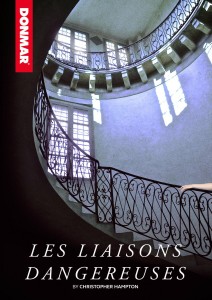 Christopher Hampton, whose version of Les Liaisons Dangereuses is being revived at the Donmar Warehouse this week (where it opens officially tomorrow December 17), interviewed in The Observer by Liz Hoggard on what differences to expect: “We just want to take advantage of the intimacy of the room. Apart from the fact that I’ve had very happy experiences at the Donmar in the past, I chose it for this revival because it’s so electric for an audience, just that sense of being in the room with the actors. Dominic [West] and I first started talking about it three years ago. We’ve been circling each other. And hopefully a new audience will come because it hasn’t been on for such a long time.”
Christopher Hampton, whose version of Les Liaisons Dangereuses is being revived at the Donmar Warehouse this week (where it opens officially tomorrow December 17), interviewed in The Observer by Liz Hoggard on what differences to expect: “We just want to take advantage of the intimacy of the room. Apart from the fact that I’ve had very happy experiences at the Donmar in the past, I chose it for this revival because it’s so electric for an audience, just that sense of being in the room with the actors. Dominic [West] and I first started talking about it three years ago. We’ve been circling each other. And hopefully a new audience will come because it hasn’t been on for such a long time.”
IN 2013, store Derren Brown brought his show “Infamous” to the West End’s Palace Theatre, cost and I interviewed him at the time for the SUNDAY EXPRESS, for sale republished below. Now he’s back at the same theatre again, appearing in “Miracle”, through January 16, before resuming a national tour. Full tour dates are here: http://derrenbrown.co.uk/on-stage/
***
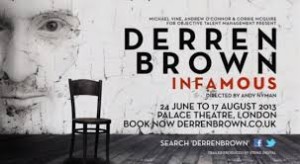 It is now ten years since Derren Brown made his West End debut with his first stage show at the Palace Theatre, and now he is back at the same address with his latest one show called Infamous. In between then and now, there have been four other West End runs, including of two shows that won him the Olivier Award for Best Entertainment in 2006 and 2012.
It is now ten years since Derren Brown made his West End debut with his first stage show at the Palace Theatre, and now he is back at the same address with his latest one show called Infamous. In between then and now, there have been four other West End runs, including of two shows that won him the Olivier Award for Best Entertainment in 2006 and 2012.
But if he has now come full circle to the same stage where he started out, Derren’s act today is very different to any he has presented before. “The feeling we had at the beginning was to create the tone of an acoustic set, like if you went to see a band that’s much less showy.”
He is sipping a mint tea in a Soho patisserie near the theatre that he likes to relax in before a show, and he’s far less showy in person than onstage, too. He is unfailingly modest, thoughtful and courteous throughout, but most of all insightful into the craft and discipline as well as the art of what makes him one of the most unique and popular stage and television entertainers in Britain today.
He never likes to tread water or recycle old shows. Having brought six brand-new shows to the West End in ten years now, he says, “Obviously if you’re a comedian, you’re used to coming up with a different show maybe every couple of years, but normally for a magician, you have your act for the whole of your life really! I remember at the beginning when we set out to do the second show thinking, ‘Oh God, I’ve got to come up with a whole new one now.’ But now I just find it is such a treat – the whole process of writing it, rehearsing it every couple of years is all part of the fun.”
And live performance is, above all, exciting.
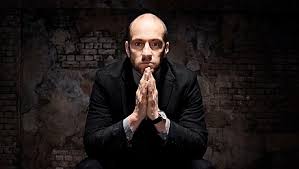 “There’s the adrenalin of doing it, which there isn’t much of when you’re working on TV. But I do try to come up with ideas that are fun and adrenalin-filled to do on TV as much as I can – the Apocalypse TV special I did last year, in which we were ending the world for someone who had no idea what he was part of, was like that. When we began shooting, he had no idea of the huge, huge experience he was about to have.” But it was also about a larger purpose: “In order to teach him about valuing what he has, we took everything away.” Wasn’t it cruel? “Maybe, but it was very carefully plotted and the end result was so positive for him and at a much deeper level than the darkness or cruelty it took to get there.”
“There’s the adrenalin of doing it, which there isn’t much of when you’re working on TV. But I do try to come up with ideas that are fun and adrenalin-filled to do on TV as much as I can – the Apocalypse TV special I did last year, in which we were ending the world for someone who had no idea what he was part of, was like that. When we began shooting, he had no idea of the huge, huge experience he was about to have.” But it was also about a larger purpose: “In order to teach him about valuing what he has, we took everything away.” Wasn’t it cruel? “Maybe, but it was very carefully plotted and the end result was so positive for him and at a much deeper level than the darkness or cruelty it took to get there.”
In the same way, he hopes to reach out to theatre audiences on a personal level. He’s doing so in this show by dealing with some of his own personal issues, like coming out as a gay man (relatively late – he only did so when he was 31, 11 years ago) and being bullied at school. Not that it’s a kind of replacement for therapy: “It doesn’t feel like therapy to me, but if you’re well known and have had a struggle of some sort, it’s good if there’s something people can take something from it. Not that I’ve had much of a struggle in the grand scheme of things, but people have written me letters afterwards, and it’s really nice to find that you’re a role model for them. I always find that magic is such a childish urge – the quickest route to impressing people is doing a trick, so something like that means a lot to me. It’s not silly me just showing off.”
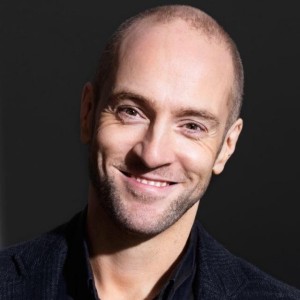 He also wants to keep taking bigger risks. “Each time I’ve done a new show, I’ve been a bit braver in terms of sheer technique I’ve been able to use. There are always sections of my shows when suddenly I need to get the whole audience involved. When I throw it out there now, I am relying on the fact that because of the prestige I have, it heightens their suggestibility, and enough people are there now who will pick up on what I do for it to happen a lot quicker.”
He also wants to keep taking bigger risks. “Each time I’ve done a new show, I’ve been a bit braver in terms of sheer technique I’ve been able to use. There are always sections of my shows when suddenly I need to get the whole audience involved. When I throw it out there now, I am relying on the fact that because of the prestige I have, it heightens their suggestibility, and enough people are there now who will pick up on what I do for it to happen a lot quicker.”
But aren’t the shows high-risk strategies? What if they don’t actually work tonight? “Every night I think it is going to fail – apart from the fact that deep down I know it won’t, because it has worked every other night!” But small things can and do go wrong from time to time, and he tries not to be too hard on himself if they do: “It’s an effort not to drive myself too mad about it, as it’s the sort of thing that I’ll be up all night about if I do. There are so many things about touring and doing a show that become personal little metaphors for life – if there’s a mistake, once a show is done I can’t go back and make it better.”
But there’s another key element to the show of surprise that he has to conscript his nightly audience – and any journalists present – into honouring by not sharing what happens in it with others. “It would be a very different experience if you knew what was coming, let alone the danger of turning things into an expectation that wasn’t the same. The fun of it is that it’s a bit like it’s a play for two actors, but the other person doesn’t know the script but you’ve still got to make it work as a play. There’s a real sense about magic, as opposed to a play or other kinds of theatre, that it happens entirely in the heads of the audience. You could present a one-man play and have bits that potentially go above their heads, but that doesn’t mean that the play has failed. But for anything rooted in magic, it does fail if they don’t get it. It’s an ongoing experience that I’m manipulating and working with at every moment, so surprise and confusion are part of the tool set I have. Aside from the pure level of enjoyment they get, it’s important to me that people don’t know what’s coming from a technical point of view.”
And the enjoyment is mutual. “I wouldn’t ever want to stop performing live, though I could happily stop the TV. When television comes up, my heart always sinks a little bit before I can get my head around it.” Right now, he is preparing for a couple of specials to be broadcast at the end of year. But first, there’s the rest of the West End run to finish, with another UK tour to follow next year. “It always amazes me how much of a joy this is.”

